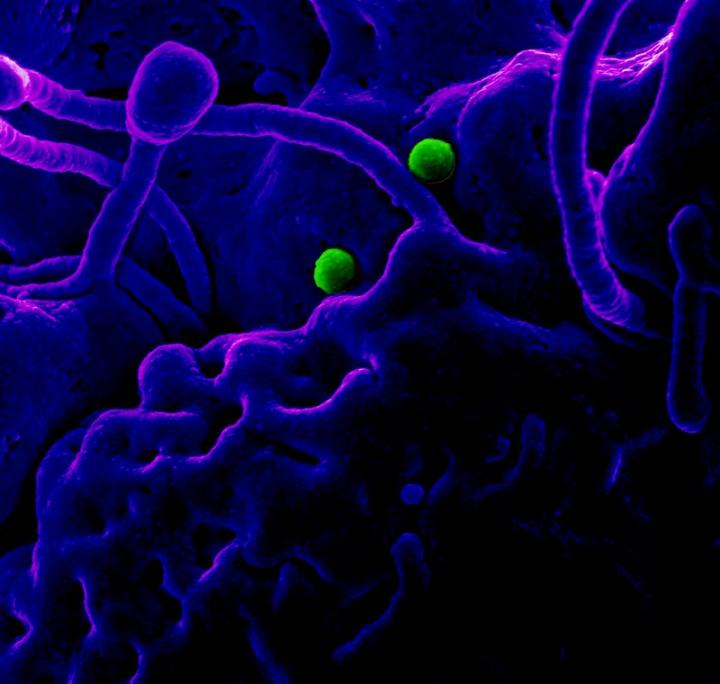
Credit: NIAID and Colorado State University
WHAT:
A randomized, placebo-controlled Phase 1 clinical trial of two monoclonal antibodies (mAbs) directed against the coronavirus that causes Middle East respiratory syndrome (MERS) found that they were well tolerated and generally safe when administered simultaneously to healthy adults. The experimental mAbs, REGN3048 and REGN3051, target the MERS coronavirus (MERS CoV) spike protein used by the virus to attach to and infect target cells. The mAbs were discovered and developed by scientists at the biopharmaceutical company Regeneron, located in Tarrytown, New York. The trial was sponsored by the National Institute of Allergy and Infectious Diseases (NIAID), part of the National Institutes of Health.
The trial was the first to test the experimental antibodies
Hyperlink Code in people. Conducted at WCCT Global, a clinical trial site in California, the study enrolled 48 healthy adults, 36 of whom received the mAbs. All volunteers were followed for 121 days after receiving mAbs (or placebo) by intravenous infusion. No serious adverse events occurred.
In preclinical studies, investigators at Regeneron and the University of Maryland, College Park, also administered REGN3048 and REGN3051 sequentially and in combination to genetically modified mice that, unlike wild-type mice, can be infected with MERS CoV. When administered one day prior to coronavirus exposure, both REGN3048 and REGN3051 reduced the levels of virus later detected in the lungs, with co-administration providing more potent protective effects than either mAb alone. Similarly, co-administering the mAbs one day after MERS CoV exposure provided a therapeutic benefit in mice by lowering viral levels and lessening tissue damage in the lungs as compared to mice that received placebo.
Together, the findings from the clinical trial and the preclinical mouse studies “demonstrate the potential efficacy and utility of monoclonal antibody therapy for the prevention or treatment of MERS-CoV and lays the groundwork for the development of spike-targeted mAb therapies for other infectious disease threats, including SARS-CoV-2,” which causes COVID-19, the authors conclude.
###
Additional information about the trial is available at clinicaltrials.gov using the identifier NCT03301090. The trial is funded through contract HHSN272201500005I.
ARTICLE:
S Sivapalasingam et al. Human monoclonal antibody cocktail for the treatment or prophylaxis of Middle East respiratory syndrome coronavirus (MERS-CoV).
The Journal of Infectious Diseases DOI: 10.1093/infdis/jiab036 (2021).
WHO:
John Beigel, M.D., associate director for clinical research, Division of Microbiology and Infectious Diseases, NIAID, is available to discuss this study.
CONTACT:
To schedule interviews, please contact Anne A. Oplinger, (301) 402-1663, [email protected].
NIAID conducts and supports research–at NIH, throughout the United States, and worldwide–to study the causes of infectious and immune-mediated diseases, and to develop better means of preventing, diagnosing and treating these illnesses. News releases, fact sheets and other NIAID-related materials are available on the NIAID website.
About the National Institutes of Health (NIH): NIH, the nation’s medical research agency, includes 27 Institutes and Centers and is a component of the U.S. Department of Health and Human Services. NIH is the primary federal agency conducting and supporting basic, clinical, and translational medical research, and is investigating the causes, treatments, and cures for both common and rare diseases. For more information about NIH and its programs, visit http://www.
Media Contact
Anne A. Oplinger
[email protected]
Related Journal Article
http://dx.




